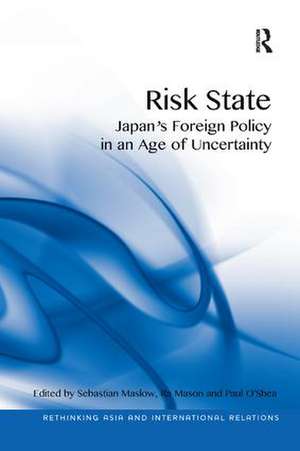Risk State: Japan's Foreign Policy in an Age of Uncertainty: Rethinking Asia and International Relations
Autor Sebastian Maslow, Ra Mason, Paul O'Sheaen Limba Engleză Paperback – 14 aug 2018
| Toate formatele și edițiile | Preț | Express |
|---|---|---|
| Paperback (1) | 297.99 lei 6-8 săpt. | |
| Taylor & Francis – 14 aug 2018 | 297.99 lei 6-8 săpt. | |
| Hardback (1) | 765.59 lei 6-8 săpt. | |
| Taylor & Francis – 28 feb 2015 | 765.59 lei 6-8 săpt. |
Din seria Rethinking Asia and International Relations
- 17%
 Preț: 258.91 lei
Preț: 258.91 lei -
 Preț: 383.71 lei
Preț: 383.71 lei -
 Preț: 476.86 lei
Preț: 476.86 lei - 19%
 Preț: 213.58 lei
Preț: 213.58 lei - 19%
 Preț: 241.15 lei
Preț: 241.15 lei -
 Preț: 469.34 lei
Preț: 469.34 lei -
 Preț: 381.72 lei
Preț: 381.72 lei - 28%
 Preț: 819.50 lei
Preț: 819.50 lei - 31%
 Preț: 764.20 lei
Preț: 764.20 lei -
 Preț: 388.64 lei
Preț: 388.64 lei -
 Preț: 402.94 lei
Preț: 402.94 lei - 16%
 Preț: 222.32 lei
Preț: 222.32 lei -
 Preț: 399.29 lei
Preț: 399.29 lei - 26%
 Preț: 764.36 lei
Preț: 764.36 lei - 18%
 Preț: 1058.38 lei
Preț: 1058.38 lei - 18%
 Preț: 1002.99 lei
Preț: 1002.99 lei - 16%
 Preț: 299.52 lei
Preț: 299.52 lei - 19%
 Preț: 238.02 lei
Preț: 238.02 lei -
 Preț: 390.37 lei
Preț: 390.37 lei - 17%
 Preț: 246.93 lei
Preț: 246.93 lei - 31%
 Preț: 762.97 lei
Preț: 762.97 lei - 31%
 Preț: 767.38 lei
Preț: 767.38 lei -
 Preț: 463.58 lei
Preț: 463.58 lei - 26%
 Preț: 762.16 lei
Preț: 762.16 lei -
 Preț: 469.34 lei
Preț: 469.34 lei - 31%
 Preț: 765.45 lei
Preț: 765.45 lei - 26%
 Preț: 764.20 lei
Preț: 764.20 lei - 30%
 Preț: 847.86 lei
Preț: 847.86 lei -
 Preț: 383.33 lei
Preț: 383.33 lei - 31%
 Preț: 767.01 lei
Preț: 767.01 lei - 18%
 Preț: 1004.55 lei
Preț: 1004.55 lei - 18%
 Preț: 1109.18 lei
Preț: 1109.18 lei - 31%
 Preț: 679.92 lei
Preț: 679.92 lei
Preț: 297.99 lei
Preț vechi: 355.88 lei
-16% Nou
Puncte Express: 447
Preț estimativ în valută:
57.02€ • 59.54$ • 47.08£
57.02€ • 59.54$ • 47.08£
Carte tipărită la comandă
Livrare economică 15-29 aprilie
Preluare comenzi: 021 569.72.76
Specificații
ISBN-13: 9781138360914
ISBN-10: 1138360910
Pagini: 202
Dimensiuni: 156 x 234 x 21 mm
Greutate: 0.38 kg
Ediția:1
Editura: Taylor & Francis
Colecția Routledge
Seria Rethinking Asia and International Relations
Locul publicării:Oxford, United Kingdom
ISBN-10: 1138360910
Pagini: 202
Dimensiuni: 156 x 234 x 21 mm
Greutate: 0.38 kg
Ediția:1
Editura: Taylor & Francis
Colecția Routledge
Seria Rethinking Asia and International Relations
Locul publicării:Oxford, United Kingdom
Recenzii
’This impressive volume covers a wide range of topics central to Japan’s foreign policy. It is unified both by a concern with policy change and an analytical perspective centring on the social construction of risk. Risk State is a must-read for everyone concerned with contemporary Japan, but will also interest students and scholars of risk society more broadly.’ Linus Hagström, Swedish Institute of International Affairs, Sweden ’Japanese leaders today must determine the level of risk they are willing to face - from potential military escalation with China to consequences of restarting potentially unsafe nuclear power reactors. This book explains how Japan’s government and society calibrate risk in making foreign policy decisions central to Japan’s survival, challenging many conventional notions of threat and interests seen in existing scholarship.’ Andrew L. Oros, Washington College, USA
Notă biografică
Sebastian Maslow is a doctoral student at Tohoku University’s Graduate School of Law where he is completing research on North Korea’s impact on Japan’s foreign and national security policy process. Previously, he taught at the Centre for East Asia Studies at the University of Heidelberg, Germany. Ra Mason is lecturer in Asia-Pacific Studies at the University of Central Lancashire, visiting research fellow with the Japan Society for the Promotion of Science at the University of the Ryukyus and an Honorary Fellow of the White Rose East Asia Centre, University of Sheffield. Paul O’Shea is assistant professor at the Department of Culture and Society, Aarhus University, and an honorary research fellow at the White Rose East Asia Centre.
Cuprins
Part I Introduction; Chapter 1 Risk Recalibration in Japan’s Foreign Policy-Making, RaMason, PaulO’Shea, SebastianMaslow; Part II Risks and Responses; Chapter 2 Internal and External Risks to Japan’s Northern Territories Policy, PaulO’Shea; Chapter 3 North Korea and the Politics of Risk-Framing in Japan, RaMason, SebastianMaslow; Chapter 4 Risk in Japan’s Militarization of Okinawa against China, Key-youngSon, RaMason; Chapter 5 Redirecting Security Narratives and Institutions in Japan’s Response to 9/11, LorenzDenninger; Chapter 6 Risks of Sameness, the ‘Rise of China’ and Japan’s Ontological Security, KaiSchulze; Chapter 7 Japan’s Foreign Policy and Transnational Environmental Risks, AsamiMiyazaki; Chapter 8 Risk Management, Disaster Diplomacy and the Struggle for National Identity in Japan, YoshikoYamada, DanielClausen; Part III Conclusions; Chapter 9 Risking Change in Japan’s Foreign Policy, PaulO’Shea, RaMason, SebastianMaslow;
Descriere
The increase of new complex security challenges and the heightening significance of a diverse array of actors has simultaneously posed a challenge to traditional perspectives on international relations and foreign policy and created an opportunity for new concepts to be applied. Conventional explanations of Japan’s foreign policy have provided us with theoretically predetermined understandings and fallacious predictions. Reformulating risk in its application to the study of international relations and foreign policy, this volume promises new insights into the analysis of contemporary foreign policy in East Asia and Japan’s post-Cold War international relations in particular.












